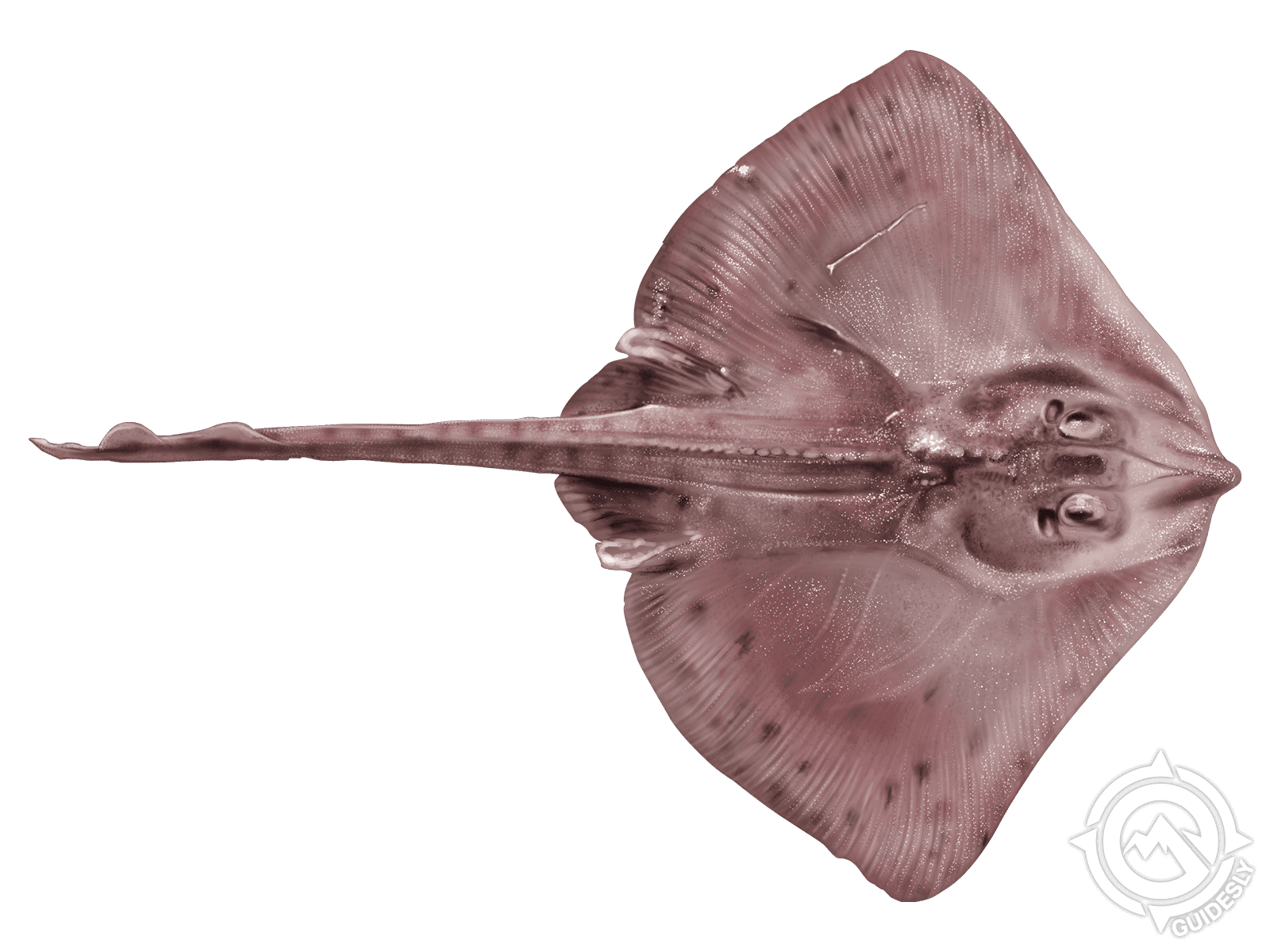Barndoor Skate

Species Details
Dipturus Laevis
Rajidae
Rajiformes
Onshore, Offshore, Ocean Floor, Continental Shelves
4 - 44 lbs.
24" - 64"
Barndoor Skate (Dipturus laevis) Fish Description
The Barndoor Skate (Dipturus laevis) is a cartilaginous fish mostly found on the seafloor. As they are closely related, this fish (or other types of skates for that matter) is often mistaken for a ray as they both have the same distinct dorsoventrally flat bodies, long whip-like tails, wing-like pectoral fins, “flying” swimming motions, and fierce predatory abilities.
The similarities, however, end there as the contrasting characteristics between the two fishes far more outweigh the likeness. Skates, for instance, are generally much smaller as compared to rays. Their tails are shorter and thicker and their snouts are more pointed as well. And although skates may have “thorns” on their backs, they’re actually quite harmless, unlike the venomous barb (which can be fatal to humans) that rays are known for.
The Barndoor Skate is the largest in the north-western Atlantic with some even reaching up to five feet in length. Aside from its size, it can easily be distinguished through its brownish-red coloration with dark spots on top. The underside may have the same white color as other skates but there are some dull gray spots. Another way to tell it apart from other skates is the long dark line that starts from its snout to the base of the tail.
Barndoor Skates are oviparous which only means they lay eggs. The females deposit their yellowish elongated eggs on sandy or muddy bottoms, usually near the shorelines. In about six to twelve months, the eggs would hatch and the hatchlings would already look a little like an adult.
Diet and Size
The Barndoor Skate is a known voracious predator. They are not picky eaters and have been known to eat pretty much anything they could find living on or near the seafloor, including large crustaceans like lobsters and crabs, as well as various fishes, mollusks, and squids. And because of their large size, Barndoor Skates doesn’t have any known predators except for large species of sharks.
Barndoor Skates, much like rays, have a reputation to be graceful swimmers, although they are not known to be fast. And although they can grow as much as five feet long, average sizes tend to be between two to two and a half feet.
Interesting Facts About the Barndoor Skate
- Barndoor Skates have been known to grow as much as five feet in length and weigh as much as forty pounds.
- There were unconfirmed reports of Barndoor Skates reaching nearly six feet long.
- They have once been abundant off the coast of North America.
- Barndoor Skates are often caught accidentally in large numbers by commercial fishers trawling the seabed for other species.
- They almost went extinct in the 80s and 90s due to overfishing—as by-catch or otherwise.
- Strict fishing regulations have been placed to help the fish population recover.
- Their numbers have been observed to be improving in the past couple of decades, although they’re not out of the woods yet.
Fishing Tips
Barndoor Skates are strong. Fishing for a large skate such as the Barndoor requires a heavy grade saltwater rod with a roller tip ring, paired with a strong line and reel for you to be able to handle the skate’s brute strength and staying power. Once you hook them on the line, you have to apply as much pressure as you can to catch them. The same thing with a Common Skate, approach the Barndoor Skate with the same concept knowing that this is the kind of fish that will either snap your line or drag you down with it. The biggest factor you'll have to check with your equipment is if it has a good drag rating. If it has a high drag rating, it should help you add more pressure onto the fish.
Equipment-wise, some people have used 12/0 hook to catch these large fishes. They also attach it to a pulley rig which is around 8-9 ft.
For bait choice, you can choose any kind of bait. Barndoor Skates aren’t known to be picky eaters and would generally be attracted to any type of fish you would use as bait. Anglers who have been successful in catching this fish, however, used either whole or strips of mackerel or herring. Some have also been successful using crabs, shellfish, ragworms, or squid. Also, keep in mind that they often hunt on or near the seabed. So make sure you present your bait near the bottom using weights.
Habitat and Distribution
Barndoor Skates are exclusively found in the waters along the coast of North America—from Newfoundland in Canada to the coastal waters of northeast Florida. They are also known to swim far offshore when the weather becomes warm, and will only return to the coastal waters when it gets cold.
Barndoor Skates are bottom-dwellers and prefer soft muddy, sandy, and rocky bottoms; although, they would sometimes swim towards the surface but not too far off their natural habitat. They would also sometimes swim near the shoreline to hunt for food but are often more abundant within depths of less than five hundred feet.







